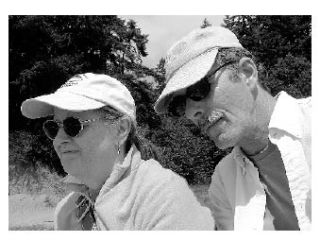Imagine someone broke into your home and stole some food and liquor. Through the grapevine, you know who the trespassers were. You could call the sheriff’s office. Or you could employ restorative justice techniques to deal with the matter by promoting healing instead of acrimony.
Paul McCold and Beth Rodman, two experts in restorative justice from Olympia, will talk about how we can apply restorative justice principles to difficult issues that arise in our Lopez community, whether it’s a conflict in the school or some other community setting or a criminal activity – any situation where people seek justice and healing. This event, sponsored by the Lopez Quaker Meeting, is set for 2 p.m. Oct. 3, at the Grace Church Fellowship Hall.
“From my perspective,” says McCold, “restorative justice is a process where all the parties with a stake in a particular offense come together to collectively resolve how to respond to the aftermath of the offense and its implications for the future.” McCold, a Quaker criminologist and internationally-known scholar in restorative justice, chairs the Thurston County Restorative Justice Initiative and the Restorative Justice Working Group of Friends Committee on Washington Public Policy.
“I do this work because my leading, since I was 25, has been to work for criminal justice reform,” says McCold. Beth Rodman, a restorative justice practitioner and trainer with 15 years experience as well as a Quaker health educator, does this work because of “her passion for raising healthy kids and nurturing healthy relationships.”
“Restorative justice gives options for participating in a variety of restorative practices that promote healing to those most afflicted by conflicts,” says Jerry Graville clerk of Lopez Quaker Meeting. The emphasis is on individuals taking responsibility for their actions and repairing harm – rather than retribution – with a goal of mending damaged relationships and communities. Difficult issues have arisen in our community before and will again in the future,” says Graville.
“Usually, we don’t have direct engagement in these kinds of conflict situations. But when people can sit down and express their hurt, pain, guilt or shame, more creative solutions may result and those involved come away feeling whole because they worked through the issues together.”
“Historically, Quakers have tried to be supportive to all parties in any given conflict and treat everyone with equal respect and care,” he adds. “We hope our Lopez community will come to listen to and talk with Paul and Beth and see if restorative justice might be an approach to consider for healing and strengthening Lopez.”
Restorative justice approaches are enormously useful in everyday life, according to McCold, and people already know how to do it. “Restorative justice is coming because it actually works dependably,” he says. “It’s already being adopted in South Africa and Canada and increasingly here in the US.”





